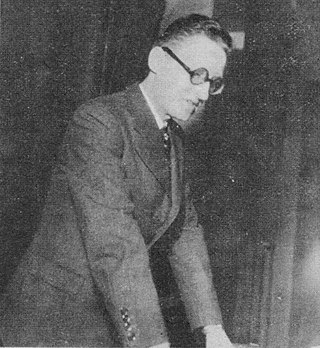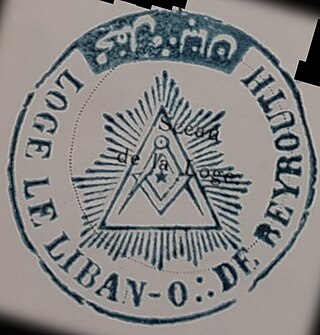
Jean-Marie Ragon de Bettignies (born 25 February 1781 at Bray-sur-Seine, died 1862 at Bruges) was a Freemason, author and editor.

Jean-Marie Ragon de Bettignies (born 25 February 1781 at Bray-sur-Seine, died 1862 at Bruges) was a Freemason, author and editor.
Jean-Marie Ragon was born at Bray-sur-Seine. [1] His father worked as a notary. He was initiated into Freemasonry in 1804 at Bruges where his duties as paymaster in the imperial administration had led him. He worked as a member of a team charged with the critical examination of dictionaries for the Journal Grammatical and published a method of reading. He was also the editor of the first French Masonic revue, Hermes. [2]
Jean-Marie Ragon was initiated into the lodge Les amis du Nord at Bruges, which at that time was administered as a department of France. He likewise belonged to the lodge Le Phœnix of the Grand Orient de France and to the Rite of Memphis-Misraim, as well as to the Order of the Temple of Bernard-Raymond Fabré-Palaprat. He founded and presided over the celebrated Parisian lodge Les Vrais Amis, which later became Les Trinosophes, which enjoyed, thanks to him, a certain renown. He occupied the post of Worshipful Master of this lodge for many years, from 1817 onwards. [2]
According to Kenneth R. H. Mackenzie, the editor of The Royal Masonic Cyclopaedia, Ragon "laboured hard to distinguish between the actual history of various Masonic societies and that vague traditional history which to so great an extent refutes itself." [3] Mackenzie also asserted that Ragon "supported the idea that Elias Ashmole was the main founder of Freemasonry in its present form." [4]

He was the author of a number of widely influential Masonic works :

Bernard-Germain-Étienne de La Ville-sur-Illon, comte de Lacépède or La Cépède was a French naturalist and an active freemason. He is known for his contribution to the Comte de Buffon's great work, the Histoire Naturelle.

André Isaac, better known as Pierre Dac, was a French humorist. During World War II, Pierre Dac was one of the speakers of the BBC's Radio Londres service to occupied France. He produced a series of satirical songs which were broadcast on the station. After the war, he participated in a comic duet with the humorist Francis Blanche.

Joseph Paul Oswald Wirth was a Swiss occultist, artist and author. He studied esotericism and symbolism with Stanislas de Guaita and in 1889 he created, under the guidance of de Guaita, a cartomantic Tarot consisting only of the twenty-two Major Arcana. Known as "Les 22 Arcanes du Tarot Kabbalistique", it followed the designs of the Tarot de Marseille closely but introduced several alterations, incorporating extant occult symbolism into the cards. The Wirth/de Guaita deck is significant in the history of the tarot for being the first in a long line of occult, cartomantic, and initiatory decks.

Liberté chérie was a Masonic Lodge founded in 1943 by Belgian Resistance fighters and other political prisoners at Esterwegen concentration camp. It was one of the few lodges of Freemasons founded within a Nazi concentration camp during the Second World War.

The Rectified Scottish Rite,(RER) also known as the Rectified Rite or RSR, is a Christian Masonic rite with a long and complex history. It was founded in 1778 at the Convent of Lyon in France under the leadership of Jean-Baptiste Willermoz, who served as the primary architect and driving force behind its formation. It emerged as a reform and restructuring of the earlier Templar Strict Observance system that had spread in Germany and France in the mid-18th century.
Freemasonry in France has been influential on the worldwide Masonic movement due to its founding of Continental Freemasonry.

The Musée de la Franc-Maçonnerie is a museum of Freemasonry located in the 9th arrondissement at 16, rue Cadet, Paris, France. It is open daily except Sundays and Mondays; an admission fee is charged. The closest métro station is Cadet. The museum was established in 1889 by the Grand Orient de France as a cabinet of curiosities in the Hotel Cadet. It was despoiled in the German occupation of France during World War II but reopened in 1973, and in 2000, became an official museum of France. In that same year, many of its historical documents were returned from Moscow, where they had been held by the KGB after Germany's defeat in World War II. The museum reopened to the public on February 11, 2010, after extensive renovations. It has the support of the Ministry of Culture, the Île-de-France region and the town hall of Paris.
The history of Freemasonry in Belgium reflects the many influences on what is now Belgium from the neighbouring states.

Jean-Baptiste Willermoz was a French Freemason and Martinist who played an important role in the establishment of various systems of Masonic high-degrees in his time in both France and Germany.

Jean Marquès-Rivière (1903–2000) was a French journalist, writer and screenwriter.
Paul Naudon, was a Doctor of Law and a 20th-century French historian, author of several books on freemasonry.

Cécile Révauger is a French historian and historiographer in the fields of freemasonry and the Lumières. A freemason, she was initiated in 1982 at the Grande Loge féminine de France. She left this grand lodge to join the Grand Orient de France in 2013. She was born in Bordeaux.

Marc Bédarride was a French writer, military officer and Freemason. He served the First French Empire during the French Revolutionary Wars under Napoleon Bonaparte in Egypt and later in the Italian Peninsula. Although born in France, the conquests of the War of the Second Coalition brought him to the Italian Peninsula where his chief legacy was the founding of the masonic Rite of Misraim in 1813.
Jean Verdun was a French writer.

Anna Féresse-Deraismes was a French feminist activist for women's rights and a Freemason. She was appointed honorary president of the International Congress of Women in 1896 and 1900, and was a founding member of the first mixed-gender Masonic Order, Le Droit Humain. Maria Deraismes was her sister.

Le Liban is a Masonic Lodge founded in Beirut on the 29th of July, 1868 under the auspices of the Grand Orient de France.
The Philosophical Scottish Rite is a Masonic rite that was established in Paris in 1776 by the hermetist Alexandre Boileau, who was a disciple of Antoine-Joseph Pernéty. This rite is known for its unique structure and progression through various degrees.
Le Rite Primitif de Narbonne or Rite Primitif des Philadelphes, is a Masonic rite that was introduced in 1759, brought from Prague by Vicomte de Chefdebien d'Aigrefeuille.